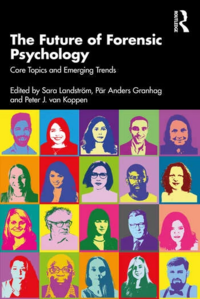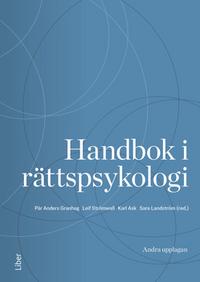
Rättspsykologi
De flesta människor vill se ett välfungerande rättssystem och känna förtroende för att brott utreds effektivt och objektivt, att skyldiga hålls ansvariga, att oskyldigt misstänkta frias, och att brottsutsatta får det stöd de behöver. För att nå dessa mål krävs omfattande insatser. Forskargruppen Research unit for Criminal, Legal and Investigative Psychology (CLIP) tar fram rättspsykologisk kunskap som ger ett viktigt bidrag till ett mer rättssäkert samhälle.
Rättspsykologisk forskning handlar om att ta fram psykologisk kunskap som kan omsättas i rättsväsendet. Forskningsområdet handlar dels om vetenskaplig utveckling och testning av olika tekniker som kan underlätta de uppgifter rättsväsendets aktörer ställs inför, till exempel att ta fram intervjutekniker som hjälper vittnen att minnas bättre. Det handlar också om att studera hur olika grupper inom rättsväsendet arbetar, såsom hur domare värderar bevis i brottmål, eller hur de som kommer i kontakt med rättsväsendet agerar, till exempel hur barn som utsatts för övergrepp minns och berättar om sina upplevelser.
Sedan år 2000 har vi i forskargruppen Research unit for Criminal, Legal and Investigative Psychology (CLIP) bedrivit forskning inom en rad olika ämnesområden som resulterat i en stor mängd forskningsfynd. Fynden har påverkat det rättsliga reformarbetet i flera länder, och några av de utredningstekniska redskap som vår forskning har bidragit till används idag av utredare världen över. Ett exempel är en teknik för användning av bevismaterial vid förhör med misstänkta, Strategic Use of Evidence (SUE), som tagits fram av forskargruppen i samarbete med svensk och internationell polis. Tekniken lärs idag ut till förhörsledare i Sverige, Norge, Finland, Nederländerna och USA.
Forskargruppen CLIP har tät och kontinuerlig kontakt med olika myndigheter och organisationer. Denna direkta kontakt är en förutsättning för att forskningsresultaten ska kunna omsättas i praktiken. Vi har genomfört en stor mängd samarbeten med och seminarier för personal inom bland andra följande myndigheter och organisationer: Polismyndigheten, Åklagarmyndigheten, polishögskolor, Domstolsverket, Sveriges Domarakademier, Barnombudsmannen, Brottsoffermyndigheten, Skattemyndigheten, Säkerhetspolisen. Som ett exempel har vi i forskargruppen tillsammans med Migrationsverket tagit fram ett så kallat beslutsstöd, Värdering av muntliga utsagor, för att hjälpa handläggare att värdera graden av tillförlitlighet i asylsökandes berättelser.


Följ oss på:
Nyheter och CLIP i media
- DN: Så drabbas den som ljuger av sina egna lögner (Extern länk)
- GP: Bedragarens knep för att invagga offren i trygghet (Extern länk)
- SVT: Därför är det svårt att utreda sexbrott mot barn (Extern länk)
- SVD: Mordet på Tove i Vetlanda börjar klarna (Extern länk)
- SR: När polisen ringer rasar världen – om sexuella övergrepp på nätet (Extern länk)
- SVD: Här är polisens taktik när misstänkta tiger (Extern länk)
- SR: Kevinfallet och de utpekade bröderna (Extern länk)
- GU: Sara Landström erhåller pris av Kungliga Vetenskaps- och Vitterhets-Samhäll… (Extern länk)
Medlemmar
Professorer
- Pär Anders Granhag
Vittnespsykologi, lögndetektion, tillförlitlighets- och trovärdighetsbedömningar, intervju- och förhörsmetodik - Karl Ask
Utredningspsykologi, social kognition, forskningsmetod - Sara Landström
Tillförlitlighets- och trovärdighetsbedömningar, sexualbrott, minnespsykologi, barns vittnesmål, intervju- och förhörsmetodik
Docenter
- Timothy Luke
Intervju- och förhörsmetodik, lögndetektion, statistik och forskningsmetod - Erik Mac Giolla
Lögnens psykologi, social kognition, replikeringsstudier
Lektorer/forskare
- Mikaela Magnusson
Förhörsmetodik, minnespsykologi, barns vittnesmål - Sofia Calderon
Lögnens psykologi, social kognition, replikeringsstudier - Emelie Ernberg
Minnespsykologi, barns vittnesmål, juridiskt beslutsfattande
Doktorander
- Lina Nyström
Intervju- och förhörsmetodik, Bedömning och beslutsfattande - Maria Gröndal
Beslutsfattning, emotionsreglering, impulsivitet, irritabilitet, ilska - Charlotte Löfgren
barns vittnesmål, rättsligt beslutsfattande, tillförlitlighet- och trovärdighetsbedömningar, minnespsykologi - Linnea Koponen
Barns vittnesmål, Intervju- och förhörsmetodik, Bildstöd, tolkade förhör
Internationella samarbeten
- International Centre for Research in Forensic Psychology (Extern länk)
- Institute for Risk and Uncertainty (Extern länk)
- Maastricht University (Extern länk)
- John Jay College of Criminal Justice (Extern länk)
- The Nordic Network for research on Psychology and Law (NNPL) (Extern länk)
- Royal Holloway Centre for the Study of Emotion and Law (Extern länk)
- Åbo Akademi (Extern länk)












